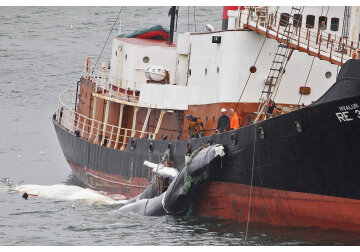
Iceland grants whale hunting permit despite animal welfare concerns
Iceland's government has issued a licence to hunt whales to the country's sole whaling company - a move condemned by animal welfare groups.
The licence for the 2024 hunting season allows the Hvalur company to kill 128 fin whales.
The decision "is based on a precautionary approach and reflects the government's increased emphasis on the sustainable use of resources," the government said.
The Humane Society International animal protection charity said the licence was granted "despite clear evidence of immense animal suffering".
It said an independent report by the Icelandic Food and Veterinary Authority on whaling in 2022 "revealed some whales killed in Icelandic hunts had taken up to two hours to die, with 41% of whales suffering immensely before dying for an average of 11.5 minutes".
"Such suffering was deemed in contravention of the country’s Animal Welfare Act," the charity said.
Iceland, Norway and Japan are currently the only three nations that allow commercial whaling.
In a statement on Tuesday, the Icelandic government said the licence to Hvalur "is valid for the 2024 hunting season".
It said the company was now permitted to hunt "99 whales in the Greenland/West Iceland region and 29 whales in the East Iceland/Faroe Islands region, totalling 128 whales".
"This decision aligns with the Marine and Freshwater Research Institute’s 2017 advice and considers the conservative ecosystem factors of the International Whaling Commission," the statement added.
Last year, Hvalur - which is believed to have two whaling vessels - was allowed to hunt 161 fin whales.
The whaling season in Iceland usually lasts from June to September, before it becomes too windy and dark.
Most of the whale meat is exported to Japan.
The practice has given rise to protests from conservation groups which consider fin whales - the second-longest marine mammal after the blue whale - to be vulnerable to extinction.
In a recent survey, 51% of Icelanders said they were opposed to commercial whaling.
Bbc.com







